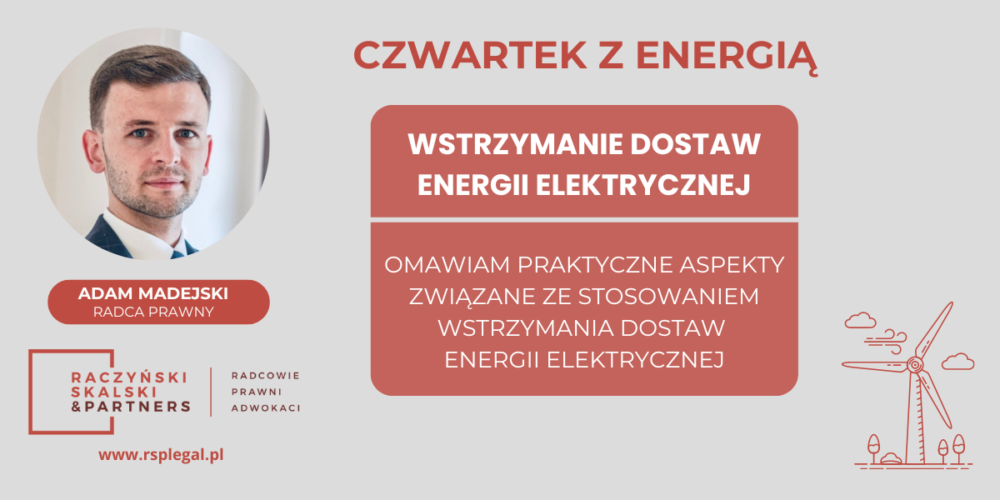Suspension of electricity supply is a measure applied to customers who are in arrears in payment of service charges or who have been found to have illegally consumed energy. This issue is regulated in the Energy Law and the instructions for network operation and maintenance. Although it functions in the common consciousness, it deserves a closer discussion in detail.
1. Rationale for application and derogations
According to Article 6b(1) of the Energy Law, the suspension of electricity or gas supply may take place in cases where:
-
-
- it is found during an inspection that illegal consumption is taking place at the customer, or
- the customer is in default of payment for services rendered for more than 30 days.
-
In addition, Section II.3.2.4. of the Distribution Network Operation and Maintenance Manual stipulates that the distribution system operator shall suspend the supply of electricity if, as a result of an inspection, it is found that the installation at the customer’s premises poses a direct threat to life, health or the environment.
However, not every customer who is late with payment of dues has to fear a sudden suspension of supply. This is because the Energy Law introduces an appropriate procedure, with exceptions for households and so-called sensitive customers.
In the case of household customers, it is necessary for the power company to notify them in advance that it intends to stop the supply. It is then necessary to set an additional deadline of 14 days for payment of obligations. Only after the ineffective expiration of this deadline is it possible to apply the withholding of supplies (Article 6b(2) of the Energy Law).
However, household customers are entitled to use the so-called alternative solution, the rules for the application of which are regulated in Article 6b paragraph 3a-3e of the Energy Law. Alternative solutions include an energy audit, assistance with electricity management or debt management. The energy company may not charge the customer additional costs if that customer uses the alternative solution. Implementation of the alternative solution takes place at the request of the customer, submitted within 14 days of receipt of the notification of the intention to suspend supply. The energy company is obliged to grant such a request, but it should be borne in mind that the alternative solution can be implemented only once a year (Article 6b Section 3e of the Energy Law).
Another exception is the so-called “sensitive consumers,” to whom the cessation of electricity supply does not apply in the period from November 1 to March 31, as well as on Saturdays and public holidays and the days preceding them (Article 6b(3d) of the Energy Law). A sensitive customer is defined as a person who has been granted a housing allowance within the meaning of Article 2(1) of the Housing Allowance Law, who is a party to a comprehensive contract or an electricity sales contract with an energy company and resides at the place of electricity supply.
2. Course of the process of suspension and resumption
Suspension of supply is carried out by the distribution system operator, either on its own initiative or at the request of the seller to whom the customer is in arrears with payments for services rendered. Such a request is considered by the operator immediately, no more than within 4 working days of receipt. It is also possible for the seller to withdraw the request to withhold supply, but this process may involve a temporary application of withholding, due to the need for information flow at the distribution system operator (IRiESD Section II.3.2.14).
The customer has the right to file a complaint, in which case deliveries must be resumed, unless the reason for the suspension was the direct creation of a threat to life, health or the environment (TNC Section II.3.2.12). Resumption continues until the complaint is resolved, and depending on the outcome, deliveries continue or are halted.
As a rule, the resumption of deliveries takes place immediately after the reasons for its application cease to exist. Unjustified application of withholding of supplies entails administrative liability on the part of the energy company (Article 56.1.14 of the Energy Law).
3. Practical issues
It is important from a practical point of view that the power to withhold supplies due to late payment applies to the dues for services rendered. This means that withholding supplies cannot be applied to customers who are in arrears with other types of payments to the seller or operator. This would be contrary to the purpose of a disciplinary measure in the form of withholding supplies – the legislator intentionally introduced this solution so that any problems with payment of dues do not immediately end in termination of the contract and the need to carry out the many activities that follow, including the dismantling of the metering and billing system.
It is worth bearing in mind that a view has been formed in the jurisprudence as to the principles of application of withholding of supplies – as summarized in a recent judgment of the Court of Competition and Consumer Protection (XVII AmE 139/21): “The power to suspend energy supplies should be considered a very severe sanction putting the energy company in a privileged position in relation to the customer, since it was only up to its decision whether or not it would resort to the most far-reaching measure in the form of ‘cutting off’ energy supplies in order to force payment of the amount due and, as it turned out, undue at the time. Such power should therefore be exercised with restraint, in accordance with the contract and only in situations that do not raise doubts about the facts. Excessive hasty use of this power by the seller or system operator may involve the risk of a fine under Article 56(1)(14) of the Energy Law – not less than PLN 10,000 and not more than 15% of the fined entrepreneur’s revenue generated from the licensed activity.
The electricity seller should consider in each case whether to use amicable means of resolving a dispute over late payment instead of withholding supplies – even if the law does not provide for it. The risks in this regard, both financial and organizational and legal, lie predominantly with the seller.



